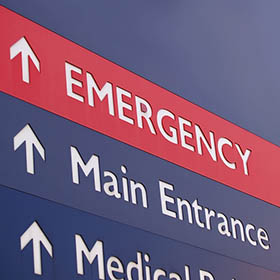- A child who is having difficulty breathing (like asthma or choking).
- Child’s color doesn’t look right (blue tinged or very pale).
- Any head injury. Observe the child for the first 12 hours after a bump on the head. During this time, if the child is dizzy, or fainted, or is too sleepy, or is difficult to wake up, or acts drunken or drowsy, or has a bad headache, or is vomiting – bring to the ER.
- A deep cut that may need stitches after-hours when clinics and doctors’ offices are closed. In the meantime: gently clean the wound with large amounts of lukewarm running water (use Betadine), and wrap or cover with a clean bandage or cloth. If bleeding is very heavy apply pressure – but not too hard!
- Seizures (also called convulsions or fits). A prolonged seizure can be life threatening. In the meantime: remove all obstacles in the area around the child and provide cushioning under the head if he/she is banging it on a hard floor. DO NOT try to stop movements, BUT turn to side if vomiting or drooling heavily.
- Any heavy bleeding that cannot be stopped within five minutes.
- An accident or injury where you think a serious injury may have occurred (e.g., depending on the force, direction, or location of the injury).
- A high fever and it is after-hours when your doctor’s office or clinic is closed (or when your doctor/ clinic instructs you to go to the ER).
- Excessive diarrhea or vomiting. Infants and very young children dehydrate quickly, so this may be a serious emergency. The child may require intravenous fluids.
- Any eye injury. Do not apply pressure or put anything into the eye.
Unsure? Call the child’s medical home if you aren’t sure a situation merits a visit to the ER or Urgent Care.
Note: If your child’s eye is swollen and/or crusty from allergies or “pink eye” (conjunctivitis), it is not an emergency. Take to an office or clinic as soon as possible. Do not to share towels or clean both eyes with the same cloth. It may be contagious from one eye to the other – or to someone else.
Poison: If the child eats or drinks something that may be poisonous (e.g., medicine, cleaning products, or plants), call Poison Control (1-800-222-1222) and get advice on what to do.
Consent: Foster parents cannot consent to treatment. Call your caseworker as soon as you get to the ER. Give all paperwork and instructions you receive from the ER to your caseworker.
Adapted from NYS Office of Children and Family Services, 2009


